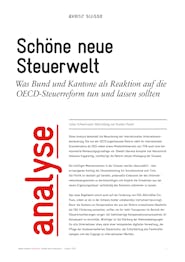With the same taxation rules to apply worldwide to large multinational enterprises from 2024, Switzerland now faces another corporate tax reform. To prevent other states from taxing a portion of profits generated in this country, the Swiss Federal Council wants to introduce a new tax in line with the OECD requirements. The so-called supplementary tax is supposed to ensure that all enterprises concerned reach the minimum tax rate of 15 percent.
Why the Confederation should not take a share of the supplementary tax
From 2024, one quarter of the receipts from the supplementary tax are to go to the federal government, and three quarters to the cantons. This distribution, as well as calls for the federal government’s share to be increased, is based on great expectations of additional tax revenues. But these fail to take account of the higher tax burden on corporate earnings. As the present analysis shows, this can be expected to decline moderately, which means that the additional revenues are being overestimated.
Against this backdrop, the federal government’s share threatens to unnecessarily limit the cantons’ financial room to maneuver. Especially for cantons with plenty of resources and a tax rate close to or above 15 percent, the reform could result in losses even if there were only a small decline in corporate profits. Given that Switzerland has an effective financial equalization scheme that really does reduce disparities between the cantons, the additional redistribution would also be alien to the existing federal set-up.
Paradigm shift in promotion of R&D requires transparency from the cantons
Through the new rules, the OECD is also exerting an influence on the incentivization of investment. This is relevant, because an extension of government support for research and development (R&D) is one of the most oft-cited measures when it comes to offsetting the locational disadvantages associated with the minimum tax rate.
While the OECD does not prohibit any specific incentive mechanisms, it does favor a tax credit granted, like a direct payment, independently of a company’s economic performance. Before the cantons make a paradigm shift by paying approved tax credits out in cash, they should create transparency on the tax relief that has been granted ‒ something about which no information is currently available at the cantonal level.
Concentrate on maintaining and reinforcing the overall framework
Specific compensatory measures beyond moderate tax incentives for R&D, however, would be a mistake. Instead, measures to achieve a stronger position in the competition for business should be broad and general in nature, concentrating on the framework for all businesses by systematically eliminating obstacles to competition.
- Digitization of the administration: Poorly digitized authorities represent such a disadvantage, depriving companies and the administration of efficiency gains. Remedying these deficits will require systematic digitization at all levels of government so that process innovations can be driven forward.
- Tax: When it comes to tax, the main burden is on the cantons. Besides systematically cultivating a customer-oriented culture of taxation, it’s possible to improve the overall framework, primarily by reducing wealth and capital gains taxes.
- Skilled labor: In the short term, easier access to well-trained workers from third countries and the introduction of individual taxation would most help ease the shortage of skilled labor. In the longer term, efforts should be made to increase the proportion of those studying STEM subjects and create a larger pool of digitally savvy school students.
- Trade policy: To secure access to international markets, which is essential for a small, open, and innovative economy, the federal government must clarify relations with the EU and reduce barriers to service trade.
Why international tax policy remains a permanent work in progress
The minimum tax could be seen as the final act in efforts to harmonize international tax policy. In actual fact, the reform deeply interferes with national fiscal sovereignty and thus goes decidedly further than all previous international coordination efforts. However, the agreement reached by almost 140 countries in July 2021 belies numerous practical problems that are already creating uncertainty before the actual implementation. The detailed rules, for example, are meeting with serious political resistance and are heavily dependent on accounting standards that can be easily influenced. There is no end in sight to the debate on the design of international corporate taxation. So it is all the more important for Switzerland to implement lean arrangements that respect the principles of decentralized federalism and resist dirigiste measures supporting politically determined goals or individual companies and sectors.






